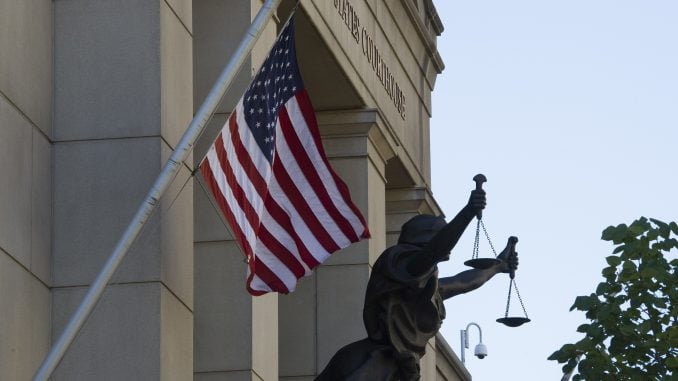
ALEXANDRIA, Va. — Lawyers for a former intelligence analyst charged with leaking classified documents about military campaigns to a reporter say the case should be dismissed because the law is being used to suppress freedom of the press.

Daniel Hale of Nashville, Tennessee, is charged in federal court in Alexandria under the World War I-era Espionage Act. That law makes it a crime to disclose national defense information to those not entitled to receive it.
Prosecutors say Hale provided a reporter with 11 top-secret or secret documents about the government’s use of drones against al-Qaeda and other targets. They include a secret memo outlining a military campaign against al-Qaeda overseas, a top-secret intelligence report on an al-Qaeda operative and a secret PowerPoint slide “outlining the effects of the military campaign targeting Al-Qaeda overseas,” according to the indictment against Hale.
In court papers filed Monday, Hale’s lawyers say the Espionage Act was intended to target spying. Now though, the Espionage Act is “used regularly against those who leak for no purpose other than informing their fellow citizens about their own government,” wrote defense lawyers Todd Richman, Cadence Mertz and Tor Ekeland. Richman and Mertz are federal public defenders.
The Espionage Act was enacted in 1917. In their motion, defense lawyers say the legislative history of the act makes it clear that the law was never intended to prosecute journalists or whistleblowers, though it was used against Daniel Ellsberg in the Pentagon Papers case.
But the law’s wording has long concerned free-press advocates because of the potential that it could be used not just against whistleblowers who leak information but also against journalists who publish it.
Hale’s lawyers said in their brief that “it is indisputable that this prosecution treads closely to freedoms that are essential to a free and democratic society.”
The Eastern District of Virginia, where Hale is being prosecuted, has been a frequent forum for Espionage Act prosecutions against leakers or whistleblowers. Prosecutors in Alexandria also have indicted WikiLeaks founder Julian Assange under the Espionage Act. The Assange prosecution charges him both with trying to help former Army intelligence analyst Chelsea Manning obtain classified documents and with disclosing those documents by publishing them on the internet.
At a hearing Friday, Hale’s trial was postponed from December until March after lawyers and the judge concluded that dealing with a large volume of classified information may delay the case.
The criminal charges do not specifically identify the recipient of the classified information, but details in the indictment make clear that Jeremy Scahill, a founding editor of The Intercept, is the reporter who received them.
The indictment states that many of the classified documents were disclosed in an October 2015 news article. On Oct. 15, 2015, Scahill published an article on The Intercept titled “The Assassination Complex” that relies on “a cache of secret slides that provides a window into the inner workings of the U.S. military’s kill/capture operations at a key time in the evolution of the drone wars.”
Prosecutors will likely file their response to the motion in a few weeks. They declined comment Monday.

